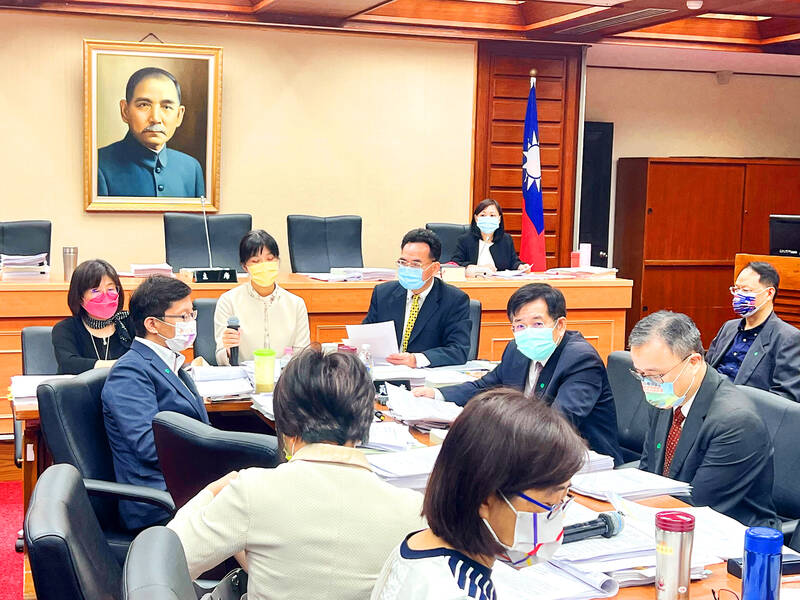Women’s sanitary products would be provided in every school and building under its purview, the Ministry of Education said yesterday, after legislators urged the government to offer better services to women, who, according to new data, spend about NT$100,000 on sanitary products throughout their lives.
The announcement came after Democratic Progressive Party (DPP) legislators Liu Shih-fang (劉世芳), Chang Liao Wan-chien (張廖萬堅), Lai Pin-yu (賴品妤), Lin Yi-chin (林宜瑾), Chen Hsiu-pao (陳秀寶), Fan Yun (范雲) and Ho Hsin-chun (何欣純) yesterday told a meeting of the legislature’s Education and Culture Committee that the ministry should provide the products in all public schools in Taiwan.
Minister of Education Pan Wen-chung (潘文忠) said that the ministry “fully supports the proposal” and would put it into practice from the next academic year.

Photo: Lin Hsiao-yun, Taipei Times
“Period poverty” has become an important part of women’s rights campaigns around the globe, Chang Liao said, adding that buying sanitary products is a burden for underprivileged families.
Teenage girls tend to feel overwhelmed when they have their first period, which usually occurs between the age of 10 and 16, he said.
Schools in the UK began to provide period products in 2018, which can help those in need, as well as familiarize students with the products and help them understand menstruation as something normal, he said.
Only some schools in Taipei, Tainan, Kaohsiung, New Taipei City and Hsinchu provide menstrual pads or have similar policies, he said.
However the availability is limited, and underprivileged families and families living in remote areas are not taken care of, he added.
The ministry should review the implementation and budgets of the programs adopted by schools within two months, he said.
The ministry should also consult experts, local governments and school representatives to evaluate the feasibility of providing free period products, and compile a report on the findings within four months, he added.
Fan said that implementing a nationwide program based on the findings would help students from low-income households.
Ho said that a nationwide program should also include supplementary measures, such as offering students guidance about related physiological phenomena.

The first two F-16V Bock 70 jets purchased from the US are expected to arrive in Taiwan around Double Ten National Day, which is on Oct. 10, a military source said yesterday. Of the 66 F-16V Block 70 jets purchased from the US, the first completed production in March, the source said, adding that since then three jets have been produced per month. Although there were reports of engine defects, the issue has been resolved, they said. After the jets arrive in Taiwan, they must first pass testing by the air force before they would officially become Taiwan’s property, they said. The air force

The Chinese military has built landing bridge ships designed to expand its amphibious options for a potential assault on Taiwan, but their combat effectiveness is limited due to their high vulnerability, a defense expert said in an analysis published on Monday. Shen Ming-shih (沈明室), a research fellow at the Institute for National Defense and Security Research, said that the deployment of such vessels as part of the Chinese People’s Liberation Army (PLA) Navy’s East Sea Fleet signals a strong focus on Taiwan. However, the ships are highly vulnerable to precision strikes, which means they could be destroyed before they achieve their intended

GLOBAL: Although Matsu has limited capacity for large numbers of domestic tourists, it would be a great high-end destination for international travelers, an official said Lienchiang County’s (Matsu) unique landscape and Cold War history give it great potential to be marketed as a destination for international travelers, Tourism Administration Director General Chen Yu-hsiu (陳玉秀) said at the weekend. Tourism officials traveled to the outlying island for the Matsu Biennial, an art festival that started on Friday to celebrate Matsu’s culture, history and landscape. Travelers to Matsu, which lies about 190km northwest of Taipei, must fly or take the state-run New Taima passenger ship. However, flights are often canceled during fog season from April to June. Chen spoke about her vision to promote Matsu as a tourist attraction in

PAWSITIVE IMPACT: A shop owner said that while he adopted cats to take care of rodents, they have also attracted younger visitors who also buy his dried goods In Taipei’s Dadaocheng (大稻埕), cats lounging in shops along Dihua Street do more than nap amid the scent of dried seafood. Many have become beloved fixtures who double as photography models, attracting visitors and helping boost sales in one of the capital’s most historic quarters. A recent photo contest featuring more than a dozen shop cats drew more than 2,200 submissions, turning everyday cat-spotting into a friendly competition that attracted amateur and professional photographers. “It’s rare to see cats standing, so when it suddenly did, it felt like a lucky cat,” said Sabrina Hsu (徐淳蔚), who won the NT$10,000 top prize in